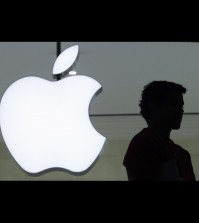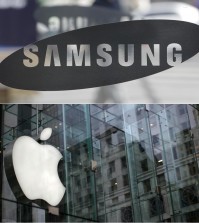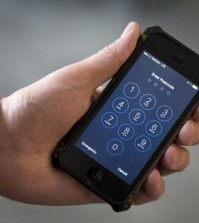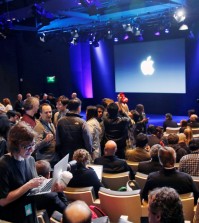- California Assembly OKs highest minimum wage in nation
- S. Korea unveils first graphic cigarette warnings
- US joins with South Korea, Japan in bid to deter North Korea
- LPGA golfer Chun In-gee finally back in action
- S. Korea won’t be top seed in final World Cup qualification round
- US men’s soccer misses 2nd straight Olympics
- US back on track in qualifying with 4-0 win over Guatemala
- High-intensity workout injuries spawn cottage industry
- CDC expands range of Zika mosquitoes into parts of Northeast
- Who knew? ‘The Walking Dead’ is helping families connect
Illegal iPhone 6 subsidies may result in legal action for S. Korean carriers
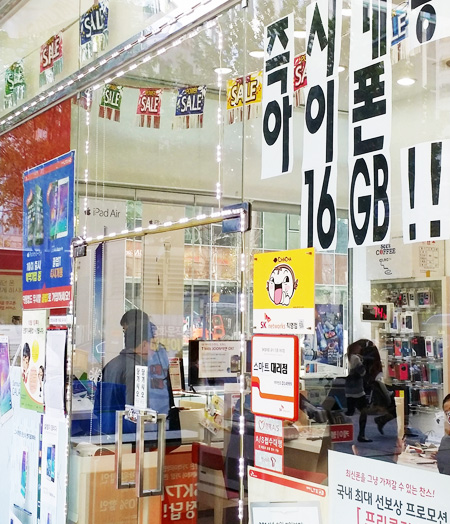
A sign attached to the entrance wall of a mobile phone retail store in Jongno, central Seoul read “iPhone 6 is immediately available.” The nation’s telecom watchdog threatened to take legal action against CEOs of local mobile carriers for disturbing the telecom market order by providing excessive subsidies for iPhone 6.
( Yonhap)
By Yoon Sung-won
The telecom industry’s watchdog threatened to take legal action against the CEOs of three mobile carriers ― SK Telecom, KT and LG Uplus ― Wednesday, for providing excessive subsidies to lure customers to buy the iPhone 6.
“Mobile carriers have provided excessively high subsidies to promote the 16-gigabyte model of the iPhone 6,” said Choi Sung-joon, chief of the Korea Communications Commission (KCC). “Accordingly, retailers used them as an incentive to attract customers.”
Choi said the KCC already has issued “strict warnings multiple times” to the mobile carriers and retailers, adding they will be fined if any illegality is revealed in an investigation.
Between Saturday and Sunday, the 16-gigabytes iPhone 6 was sold for between 100,000 and 200,000 won in some retail stores and by private dealers, only one day after the launch of Apple’s latest smartphone.
The factory price was set at 789,900 won and the maximum subsidy reported by the three carriers was 250,000 won.
The telecom act says that any provision of a subsidy over 300,000 won is illegal.
After the news, customers who had already bought the iPhone 6 at the full price expressed regret and anger. While criticizing companies for deceiving them, they also blamed the government for failing to enforce the new telecom act, which was devised to ensure fair trade in the local telecom market.
The KCC chief said the new act “did its role in some part, changing the consumption pattern of the local handset market to become more rational and economical.” He added that the recent issue of illegal subsidies for the iPhone 6 came in the middle of the changing process and pledged to put in “strict measures” to retain the positive effects of the act.
The three telecom companies, which have denied direct involvement in the recent illegality, backed off and made official apologies later in the day and promised to conduct a thorough investigation to prevent any recurrence.
SK Telecom apologized for “causing inconvenience and confusion to customers by failing to prevent the illegalities committed by some retailers.”
KT said it is “very sorry that some retailers have joined in the competition and disturbed the market, despite the fact that the company has continued to direct them not to operate illegally.” It also vowed to conduct “strong measures” to any illegal activities by suspending operations of retail stores or stopping the supply of smartphones, while punishing those responsible and directing them not to repeat it.
LG Uplus, which has introduced Apple’s iPhone for the first time, said it feels “deeply sorry that some of the retailers disturbed the market order, standing against the direction of the headquarters,” and promised to “cooperate with the KCC’s investigation and punish those who are related to any illegalities.”







